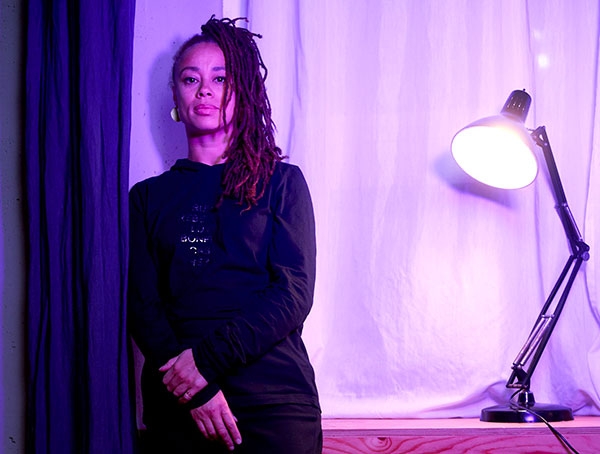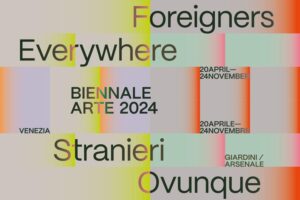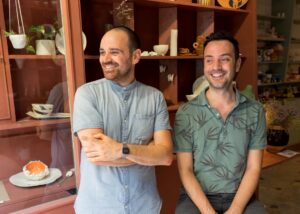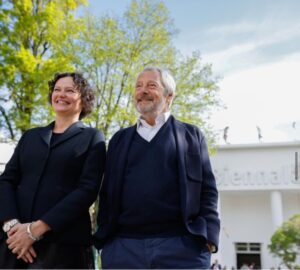
In occasione del simposio “I AM HERE – on counter narratives from Europa” – organizzato a Milano da BASE in collaborazione con Arkipelago – abbiamo incontrato Jeannette Ehlers, artista danese di origini caraibiche la cui ricerca si incentra su tematiche decoloniali. Guardare alla Storia, alle azioni dell’Europa colonialista, per riflettere sulla contemporaneità e l’identità è il nodo della sua opera. Con lei abbiamo parlato dello spazio sensibile tra pensiero politico e sentimento privato.
Let’s start from your investigation. Your origin of course is conditioning your work, so how is your approach? It is part of a personal need before to be political or do you fell yourself like an activist?
My approach is often very personal but at the same time I open up my personal perspective to embrace a universal angle. The famous feminist slogan ”The personal is political” is very well describing my approach to my work. My point of departure is my affiliation with the African Diaspora as well as to challenge the Scandinavian colonial amnesia. For example I try to reconnect the scattered pieces of Danish Colonial History, to shed light on erased narratives as well as investigate and create knowledge production on how the colonial structures impact today’s society. To shed light on the darker side of Modernity, as it is framed by theorist Walter Mignolo. I work within a decolonial discourse.
Mignolo said that “the decolonization of knowledge is closely connected to the decolonization of feeling and perceiving and both contribute to develop decolonial subjects”[1] and your artworks combine the historic perspective and the emotional side too. I’m thinking about Whip It Good and The Gaze for example…
Would you tell us something about it?
The two pieces you mention are very confrontational and they force the beholder/ participant to engage emotionally. But on top of that there are historical layers to the pieces as well, so the work also challenges you consciously. Art is a great tool to tear down barriers and reconnect in new ways, and in this case to challenge and delink from Western values and norm settings. My experience is that the pieces can create very strong emotional as well as intellectual reactions and understandings. For some very disturbing and for others quite cathartic.
With regard to the amnesia, The Gaze presents the issue in contemporary terms…
Yes The Gaze is drawing a straight line from colonial times to the present and it also deals with White Supremacy and the great Western colonial denial. The European colonial project is still very present. Concerning the “refugee crisis” in Europe people tend to “forget” that Europe invaded almost the entire world dehumanizing black and brown people, and still benefit from it, still exploit the Global South. Much of what is going on is because of Western imperialism. And the migration situation in Europe and elsewhere is a consequence of Western colonial history Many immigrants coming now are simply forced to come and take a piece of the cake the Europeans stole from them. Everybody wants a good life. And the Western World doesn’t want to face the fact that it caused the problem. Simply don’t want to deal with it. That’s so upsetting! It’s not like the situation happened overnight. It has deep colonial/ capitalist roots. So the quote in the piece, referring to Stewart Hall, says it all: I’m here because you were there.
Do you believe in the social mission of art?
I definitely believe that art has the ability to change ones perspectives and in that way impact socially. Art is able to open your mind if you let it. It appeals to your senses in a completely different way than straight up politics. A lot of art offers you a bodily experience, which you don’t get elsewhere, which again can change your perception of the world. Art is capable of combining complex structures and raise complex questions in new and unexpected ways and very importantly in poetic manners. That is the power of art!
I was considering that a lot of female artists work on the colonialism, post colonialism, decolonialism issues starting from personal life. Of course, not only women but, for example, I’m thinking about Kara Walker, and the Ecuadorian artist Karina Skvirsky Aguilera or the Chilean Ingrid Wildi Merino. And Toni Morrison in literature…What do you think about it? Maybe women are more naturally inclined to investigate the space between the private feelings and the political action?
Women, and especially black and brown women, as well as LGBTQ+ people, are going through and have always gone through massive struggles in colonial societies. So dealing with the arts is a great way to be radical, to resist the oppressive structures of white patriarchy. In many cases I believe it feels quite natural to take action in ones own experiences and life when dealing with such issues. So in that sense it makes totally sense to start from ones personal life.
Jeannette Ehlers, based in Copenhagen, Denmark, graduated from The Royal Danish Academy of Fine Arts 2006.
In her work meaning and identity are explored, in both a sophisticated and immediate way. She challenges and explores the film medium’s ability to communicate in a visually fascinating and engaging language. Creating imaginative stories with edge and sharpness, her work still retain the broad appeal. Her pieces revolve around big questions and difficult issues, such as Denmark’s role as a slave nation – part of the Danish cultural heritage, which often gets overlooked in the general historiography.
Her most recent solo show: 2019 I Am Here – BASE + CareOf, Milan; 2018 I Am Queen Mary, A public sculpture project in collaboration with La Vaughn Belle, KAS, Copenhagen; The Invisible Empire: Confronting the Scandinavian Colonial Amnesia, Chez Eva@Galleri Futura RAISE, The McKenna Museum of African American Art,New Orleans; 2015 Whip it good: Spinning from History’s filthy mind, Solo-exhibition, Autograph ABP, Rivington Place, London; 2014 SAY IT LOUD!, Nikolaj Copenhagen Contemporary Art Center, Copenhagen.
Selected group show: 2019 Ecologies of Darkness:Building grounds on shifting sands- Incantations- SAVVY Contemporary Berlin; 2018 Decolonizing Appearance, CAMP- Center for Art on Migration Politics, Copenhagen; Tak og i lige måde, Contemporary Art from Denmark, Reykjavik Art Museum; 2017- Stop Slavery! , Workers Museum, Copenhagen; Relational Undercurrents, Contemporary Art of the Caribbean Archipelago, MOLAA, LA, USA; Ink and blood: stories of abolition – International Slavery Museum, Liverpool.
- Jeannette Ehlers,The invisible Empire, 2010, still video
- Jeannette Ehlers, The Gaze, 2018, still video












